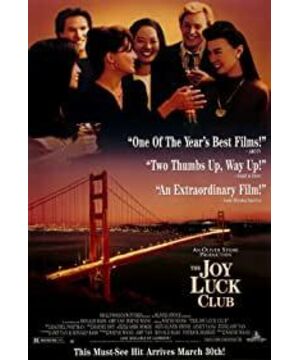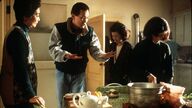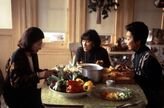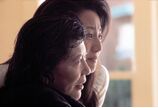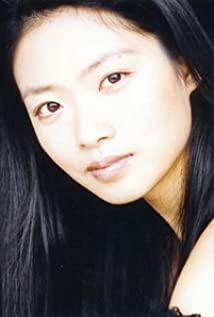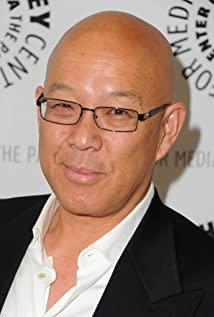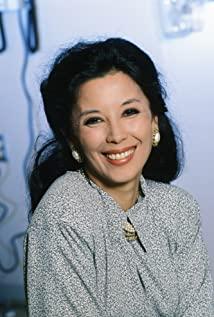——Comment on the film "The Joy Luck Club"
Chinese American director Wang Ying adapted this film based on the novel "The Joy Luck Club" by Chinese American writer Amy Tan.
A movie tells the story of eight women, and it is also skill to be so calm. The blocky structure is slightly mediocre, but at least every woman's face is clear. These eight women, their lives are directly or indirectly related to the East, to be precise, China. In this movie, China is a place where the four mothers need to escape in real space. The trip to the United States makes them the starting point for their self-liberation; for the four daughters, it is a need in the soul. In the space to escape, they need not to live like their mothers, but to become stronger in their hearts. In this way, the liberation of women and the separation from China are juxtaposed.
I think that both feminist views and Said’s criticism of Orientalism can be summed up in one simple sentence: "The weak" are always written and shaped. They do not have the opportunity to speak for themselves, so they exist. Become the "other" in the subject's imagination. (The reason why the weak people are quoted here is because they have chosen a common term for the convenience of generalization. In fact, they-whether they are women or Eastern society-are probably not actually "weak") This generalization is of course The richness of the two theories cannot be included, but the similar core of the two theories can be explained from one aspect. And because of this, Eastern women are even more marginal. In this film, the relationship between female images and Chinese images is very subtle, so this article will use feminism and reflections on Orientalism to analyze the concept of the film between the portrayal of female characters and the depiction of the Chinese landscape. Out of sync. At the same time, we explored how these two out-of-synchronization concepts contained each other, resulting in both progressive and conservative vague expressions.
one. The establishment of female subjectivity
The original author of the novel is the female writer Amy Tan. The author's female identity and the portrayal of female images in his works make the novel "The Joy Luck Club" a typical female text. Although Wang Ying is a male director, in this regard, she does a better job of complying with the original work (perhaps because of Amy Tan's participation in the screenwriting). The protagonists are eight women, but in fact, the women’s self-seeking journey revealed in the film not only happened to these eight women, but also includes An Mei's mother (played by Wu Junmei) and Lin Duo's mother (Xi Meijuan). So this journey spanned three generations of women. Through the processing of narrative and images, the film has shaped the world of such a woman, these women are as weak as swan feathers, but have completed the process of self-affirmation across the ocean.
First of all, no matter in narrative or video, the father is absent or omitted deliberately. None of the fathers of the four daughters, or even the fathers of the four mothers, entered the main line of the narrative. They are not the spiritual support of their daughters, nor are they idols to worship. Even the mother who rescued her daughter during the crisis was the mother. The fathers are out of the depth of field, a vague figure. The end of Jun's father's play also takes on the task of telling Jun's mother's past, and serves as a bridge for spiritual continuity between mother and daughter. This father is short and wincing a little. The absence of the father highlights the importance of the mother and makes the inheritance of this independent spirit have matrilineal characteristics, making the road of women's liberation a way of self-help.
This Joy Luck Club has always been managed by Jun's mother, or supported by those four mothers. This is a very meaningful treatment. In the excellent feminist film "The Antonia Family", people are always happily gathering in Antonia’s yard. As time goes by, there are more and more people. A matrilineal society was established. The Joy Luck Club is similar to this. It was all women who maintained a small organization. This organization is the home of people's emotions and a weapon for people to fight alienation. Although it is still a parent's shortcoming, women's work is nothing more than food preparation, but trivial work is the cornerstone of society.
The women in it range from the typical old oriental women who endure the humiliation to the new American women who try to give up the past. Each woman has a different face, which seems to outline a map of the liberation process of women. An Mei's mother used death to awaken An Mei, and the price was huge. Yingying gained her freedom by drowning her son in a self-masochistic way, and implemented this pursuit of dignity on her daughter after a long life. The unbearable memories of the relationship between the two sexes and the extreme behaviors that the mothers have experienced or carried on their backs have enabled the daughters to finally think about their marriage in a more peaceful and rational way and maintain their dignity. It's like Rose regained her husband's heart with just one word (of course, the film's portrayal of the "Prince Charming" is too perfect).
Although it may be due to the original novel, some words are expressed too bluntly and slightly dogmatic. In addition, the film's exposure of patriarchy is simple and straightforward. But creators are always trying to establish female subjectivity. Whether it is the narration narrated by women or the memories surrounding women, this is clearly confirmed.
2. Loss of "China" subjectivity
"Loss" may be inappropriate, because under the shadow of Orientalism, the East has never become a subject. Amy Tan is the second generation of immigrants and was born in the United States. The understanding of mainland China may only come from the elders' narratives, perhaps with the same prying and secretive psychology as Westerners.
And because of the unique identity of the director Wang Ying, the film’s description of China is embodied as a Chinese director who has created a "Chinese-style" image and a "Chinese-style" story based on the Western imagination of mainland China. The director's judgment as a Chinese has failed, and instead uses Western standards to shape his image and tell stories. So the story that happened in China in the film is full of symbolic elements. Whether it is the depiction of the event itself, the image of the characters, and the relationship between the characters, they are all "typical" to a great extent.
These stories include the story of a child daughter-in-law who has a ignorant little husband and an evil mother-in-law; it also includes the story of a widow who remarries, she became a concubine, was spurned by her family, and committed suicide by swallowing opium. , She was a progressive woman, but she married a bad husband and was abused. These stories are almost ready to be called "prototypes" in China's current film and television works. But it is not awkward to put it in mainland film and television works. The reason is that only "prototype" is not enough, only the details are similar. The most important thing is that the character's psychological logic must be correct, and at least it should be the psychological logic of the Chinese. But these typical stories are put in a movie and played out like an exhibition. Let alone Westerners, I believe that even the Chinese will look like Grandma Liu entered the Grand View Garden. In order to finish the exhibition, I didn't care about the logic of the characters' psychological reactions. For example, as a child's daughter-in-law, Lin Duo's family moved to the south, so they should have lost contact. How could a little girl dare to flee resolutely? Besides, the lie about the ancestors is so vivid and vivid. How could Lin Duo, who had a hard-won background, be smarter than the big family? Isn't she afraid that the ancestors will really come to punish? Is she actually an atheist? The same is true for several other stories. The narration continues to enter the narrative, trying to speed up the narrative and establish a psychological basis for the characters' behavior, but it can't escape the cliché plot and add it in one mind. These stories reflect the Western imagination of the ignorance and backwardness of the East. Of course, these may be facts, and they really existed in Chinese society at the time, but, just as all the real news in the newspaper may finally be pieced together into a huge illusion, the construction of these facts can only be part of China— -But it may very well be the entire Western imagination about China.
There are also those symbolic characters: child bridesmaid, concubine, wicked mother-in-law, facial matchmaker. There are also the mysterious things: the curse of ghosts, the therapy of cutting flesh to save the mother... China has become a scene, turning page after page, a dazzling array. Here, China is free to write. Perhaps, for Amy Tan or Wang Ying, the memory of China is just like a scene in a movie: Lin Duo’s mother—played by Xi Meijuan, a simple and typical Chinese female The face appeared in a small square mirror. It was dark all around, and the face in the mirror was covered with dim light.
Three, chaotic narration
As mentioned earlier, the narrative ambiguity of the film was caused by the creator's misplaced conception of women and the East. Women and China are both marginal individuals. One has a self-establishment, and the other has fallen further. The establishment of female subjectivity is based on the premise of fleeing from China. (Although it is "Old China" or "Ancient China." But Americans’ impressions of China are mostly an "ancient country." We are an ancient civilization. People automatically dropped the word "civilized".) So, female This kind of liberation can be questioned. Will their escape be another kind of arrest? Did they save themselves or did the United States save them? In fact, if we consider the extent to which women have been liberated since the founding of the People’s Republic of China, what is the point of their escape (measured by the status of women alone)? For feminists, getting their own liberation in this way is useless to change the status quo of women. They are nothing more than a rude patriarchal society into a relatively civilized patriarchal society. Their degree of subjectivity depends on the degree of patriarchy in the society. The handsome and wealthy young master, Yingying's young Chinese husband was carefree and cruel, while Rose's husband was polite. After Rose dared to express himself, he fell in love with her again and lived happily together. Don’t forget. He also cheated.
Similarly, for China, the attitude of creators is also chaotic. Every woman, especially her mother, cannot eliminate the influence China has left on them. The most interesting setting is Jun and her mother. Jun has been unmarried, and seems to be unsuccessful in all aspects. But she finally came to China to be reunited with her twin sister. She has no husband but can better understand the concept of home. Previously, I thought one of the most interesting lines in this film was also used on her. Lin Duo said to Jun: "You American girls must think that there is a difference between Chinese and Jews?" This is a reflection of Orientalism. Little provocation. It tells American audiences that China has its own characteristics, but unfortunately the film does not provide any active construction. But in the end it was this "American girl" who returned to China. The film began to take a group photo, lacking Jun's mother, and she finally appeared in China, standing with one of her daughters, although that was Jun's fantasy. However, this seems to indicate that there are always some defects in the lives of these women, and that incompleteness is a memory of China. The creator expressed the expectation of cultural integration.
The movie itself may not be a complicated text, but in this context, it presents interesting complexity. The novel "The Joy Luck Club" made Amy Tan's fame in the United States, and the movie "The Joy Luck Club" allowed Wang Ying to enter Hollywood. Both women and China need their own narrators. Although such a narrator may still be unable to get rid of the influence of patriarchy or Orientalism.
View more about The Joy Luck Club reviews


